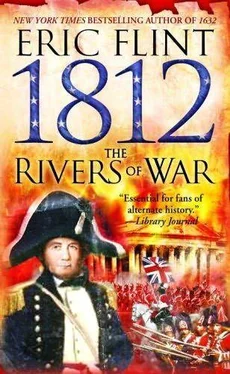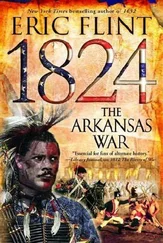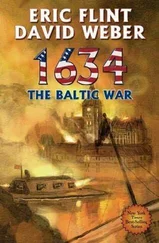Eric Flint - 1812 - The Rivers of War
Здесь есть возможность читать онлайн «Eric Flint - 1812 - The Rivers of War» весь текст электронной книги совершенно бесплатно (целиком полную версию без сокращений). В некоторых случаях можно слушать аудио, скачать через торрент в формате fb2 и присутствует краткое содержание. Жанр: Альтернативная история, на английском языке. Описание произведения, (предисловие) а так же отзывы посетителей доступны на портале библиотеки ЛибКат.
- Название:1812: The Rivers of War
- Автор:
- Жанр:
- Год:неизвестен
- ISBN:нет данных
- Рейтинг книги:4 / 5. Голосов: 1
-
Избранное:Добавить в избранное
- Отзывы:
-
Ваша оценка:
- 80
- 1
- 2
- 3
- 4
- 5
1812: The Rivers of War: краткое содержание, описание и аннотация
Предлагаем к чтению аннотацию, описание, краткое содержание или предисловие (зависит от того, что написал сам автор книги «1812: The Rivers of War»). Если вы не нашли необходимую информацию о книге — напишите в комментариях, мы постараемся отыскать её.
1812: The Rivers of War — читать онлайн бесплатно полную книгу (весь текст) целиком
Ниже представлен текст книги, разбитый по страницам. Система сохранения места последней прочитанной страницы, позволяет с удобством читать онлайн бесплатно книгу «1812: The Rivers of War», без необходимости каждый раз заново искать на чём Вы остановились. Поставьте закладку, и сможете в любой момент перейти на страницу, на которой закончили чтение.
Интервал:
Закладка:
Coffee studied the map intently, as did Sam. It was hand-drawn, and showed the terrain of the Territory of Mississippi, where the Red Sticks were concentrated. The Red Stick faction of the Creeks, the southern allies of Tecumseh, came mainly from the Confederacy's Upper Towns. By and large, the Lower Town Creeks had either remained neutral or were allied with the United States.
American newspapers tended to portray the Red Stick war as an attack on white settlers. It was that, certainly, but it was more in the way of a civil war among the Creeks themselves. The people massacred at Fort Mims by the Red Sticks a few months earlier, on August 30, had mainly been Creeks, not whites. Mixed-bloods, true, most of them-but the same could be said of the Red Sticks, especially their leaders. Tecumseh and his brother The Prophet had sought to unite all Indians against the whites. But, like most Indians, they viewed the distinction between "red men" and "white men" more along cultural lines than strictly racial ones. Many of Tecumseh's followers, especially the Creek warriors of the Red Stick faction, had some white ancestors themselves.
Tecumseh himself was dead now, killed in Canada in October, when U.S. forces under the command of General William Henry Harrison had defeated the British and their Indian allies at the battle of the Thames. It was reported that Colonel Richard Johnson, who'd led the final cavalry charge and had been badly wounded in the affray, had shot Tecumseh personally. But the fires Tecumseh and his brother The Prophet had lit among the many Indian tribes were still burning in the southern territories of the United States.
Coffee rubbed his chin. "Are you sure you don't want to wait for the Georgians to regroup, General?" His finger traced the lines of the Coosa and Tallapoosa rivers. "We're not going to move easily through this terrain. It's pretty much pure wilderness, by all accounts I've received."
Jackson shook his head impatiently. "We haven't time for a slow campaign, John. The real enemy is the British, don't ever forget it. We've got to crush this uprising as soon as possible or we'll still be tied up when the British arrive."
"You may be jumping to conclusions, General. Napoleon might beat them, you know, even after his defeat at Leipzig. If he does, the British won't be in any position to send more troops all the way across the Atlantic."
Sam was a little surprised that Coffee didn't hesitate to argue the matter. After witnessing the Homeric temper tantrum Jackson had just thrown, Sam himself would have been a little hesitant to disagree with him under any circumstances.
But the general didn't seem to mind. "All my hopes are with Napoleon, to be sure. But…" He sighed. "The bastards are already into France itself. Marching on Paris, according to the latest news. I just can't assume that he'll win. And if he loses, which at this point I'd have to say he probably will, then the British Empire is going to bring all its power down on us. With the Spanish holding their coats. Before that happens, we've got to have the savages under control."
Again, he gave Sam that sidelong glance. "Begging your pardon, Ensign."
Sam suppressed a sigh of his own. He had a sneaking suspicion the general was going to needle him on the subject for… quite some time.
Jackson turned back to the map, his own finger tracing a route along the Coosa. "I intend to start our march as soon as possible. We'll follow the Coosa down to here, at which point we'll move eastward toward Emuckfaw. From there, we'll just be a short distance upriver from the horseshoe bend on the Tallapoosa, where Chief Menawa and Weatherford and about a thousand Red Stick warriors have forted up.
"John, I'll want you and your cavalry-you'll be working with the Cherokees, too-"
TheRiversofWar
CHAPTER 2
When The Ridge and his companion saw the militia officer come scuttling out of General Jackson's tent, they said nothing, but they did exchange a little smile. Some of the Creeks had already started calling the American general "Sharp Knife," and The Ridge was pretty sure it wouldn't be long before the Cherokees who were Jackson's allies would be doing the same.
The smile faded soon enough, however. When it came to the Americans, there wasn't much for Cherokees to smile about.
Many Creeks, and a fair number of Cherokees and Choctaws, would explain it on the simple grounds that the Americans were white people, and, as such, a fickle and treacherous race. But The Ridge didn't think even the Red Sticks really believed that. Maybe in the North they did, where Tecumseh himself had come from. The Ridge didn't really know that much about those tribes, even though the stories claimed the Cherokee themselves had come from the North, long ago. Those stories were probably true, he mused, since the Cherokees spoke a language that was similar to the Iroquois.
But racial explanations didn't make much sense to The Ridge, and never had. He was himself mostly a full-blood, yet all he had to do was look around him to see the extent to which "the Cherokees" had long ago begun to change, on that level which the whites called "race." Even the name "Cherokee" was of white origin. The term the Cherokee themselves used was "Ani-Yunwiya," which meant the "Real People" or the "Principal People."
All he had to do was look at the man squatting next to him, in fact. Young John Ross.
To all outward appearances, John Ross was a white man himself. His skin was as pale as any white man's; his hair was red; his eyes were blue. Nor was that a freak of nature. Measured by blood, John Ross was a white man. The Ridge didn't know him well yet, since he'd only just met him on this campaign, but he knew some of the man's ancestry. Seven of his eight immediate progenitors were white people, mostly of Scot extraction. Only one of them, his great-grandmother Ghigooie of the Bird Clan, had been a Cherokee.
But the way the Cherokee measured such things, that made John Ross a member of the clan. The fact that he looked like a Scotsman simply didn't matter, as far as they were concerned. The Ani-Yunwiya traced lineage through the mother's line, not the father's. The white man's concept of "race" was an alien one. The people whom the Americans called "Indians" actually belonged to a wide variety of peoples, who spoke different languages and had different customs.
No, The Ridge wasn't really an Indian, except insofar as the white people placed him in that category. But because they did, he had to deal with it, because he had to deal with them.
From his own viewpoint, though, he was Ani-Yunwiya, because he belonged to one of the seven Cherokee clans. The Deer Clan. Beyond that, he recognized kinship with many other tribes, since Cherokees often married outside the seven clans.
John Ross probably had a better understanding of the white way of thinking, even if he didn't agree with it. Despite his youthful age, Ross had already acquired a reputation among his people, and he was emerging as a Cherokee leader. Certainly no one doubted his loyalties to the Bird Clan.
Things were no different with their Red Stick enemies. Somewhere in the distance to the south, the Red Stick faction of the Creeks had forted up on a bend of the Tallapoosa River in an attempt to withstand Jackson's coming assault. Their loyalties to their own leaders were fierce, but had little to do with race. Their central war chief was a man who, like most Indians of the time, had two names. Red Eagle, and
… William Weatherford.
Like Ross, Weatherford had more white than Indian ancestors. That hadn't stopped him from leading the successful attack on Fort Mims, although rumor had it that Weatherford had tried to prevent the massacre of the fort's population. But The Ridge was quite sure that race had nothing to do with the massacre, either. Most of the people massacred at Fort Mims had been Creek half-bloods, just like Weatherford himself and many of his Red Stick followers. The different ways in which white people and red people measured difference to begin with was just one of the many problems they had faced, separately and together, for over two centuries now.
Читать дальшеИнтервал:
Закладка:
Похожие книги на «1812: The Rivers of War»
Представляем Вашему вниманию похожие книги на «1812: The Rivers of War» списком для выбора. Мы отобрали схожую по названию и смыслу литературу в надежде предоставить читателям больше вариантов отыскать новые, интересные, ещё непрочитанные произведения.
Обсуждение, отзывы о книге «1812: The Rivers of War» и просто собственные мнения читателей. Оставьте ваши комментарии, напишите, что Вы думаете о произведении, его смысле или главных героях. Укажите что конкретно понравилось, а что нет, и почему Вы так считаете.











